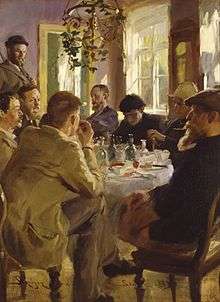Frits Thaulow
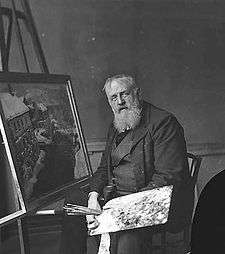
Frits Thaulow (Christiania, 20 October 1847 – Volendam, 5 November 1906) was a Norwegian Impressionist painter, best known for his naturalistic depictions of landscape.[1]
Biography
Johan Frederik Thaulow was born in Christiania, the son of the wealthy chemist, Harald Conrad Thaulow (1815–1881) and Nicoline ("Nina") Louise Munch (1821–1894). Thaulow was educated at the Academy of Art in Copenhagen in 1870–72, and from 1873–75 he studied with Hans Gude at the Baden School of Art in Karlsruhe.[2][3]
Thaulow was one of the earliest artists to paint in Skagen in the north of Jutland, soon to become famous for its Skagen Painters. He arrived there in 1879 with his friend Christian Krohg who persuaded him to spend the summer and autumn there. They arrived from Norway in Thaulow's little boat. Thaulow, who had specialized in marine painting turned to Skagen's favourite subjects, the fishermen and the boats on the shore.[4]
After his stay in Skagen, Thaulow returned to Norway in 1880. He became one of the leading young figures in the Norwegian art scene, together with Christian Krohg and Erik Werenskiold, and helped established the first National Art Exhibit (also known as Høstutstillingen or Autumn Exhibit) in 1882. Many of Thaulow's best known Norwegian scenes are from Åsgårdstrand, which had become an important center for artists and painters dating from the 1880s.[5]
Thaulow moved to France in 1892, living there until his death in 1906. Thaulow soon discovered that the cityscapes of Paris did not suit him. His best paintings were made in small towns such as Montreuil-sur-Mer (1892–94), Dieppe and surrounding villages from (1894–98), Quimperle in Brittany in (1901) and Beaulieu-sur-Dordogne in the Corrèze département (1903). [6] In Dieppe Thaulow and his wife Alexandra made themselves popular: they were friends with artist Charles Conder, and they met Aubrey Beardsley.[7]
Thaulow received a number of honors for his artistic activity, including his appointment as commander of the 2nd Royal Norwegian Order of St. Olav in 1905. He received the French Legion of Honor, Order of Saints Maurice and Lazarus from Italy and the Order of Nichan Iftikhar from Tunisia. He died in Volendam, in the Netherlands. The National Gallery of Norway features 37 of his works. Other prominent displays include The Hermitage Museum in St. Petersburg, The Museum of Fine Arts in Boston and the Busch-Reisinger Museum at Harvard University.
Personal life
Thaulow was married twice. In 1874 he married Ingeborg Charlotte Gad (1852–1908). The marriage dissolved in 1886. In 1886 he married Alexandra Lasson (1862–1955), the daughter of Carl Lasson (1830–1893), a noted Norwegian attorney. He had three children with his second wife: Harald Thaulow (1887–1971), Ingrid Thaulow (1892–1983) and Christian Lasson Thaulow (1895–).[8]
Selected gallery
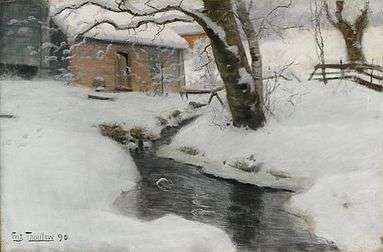 Norsk vinterlandskap
Norsk vinterlandskap
1890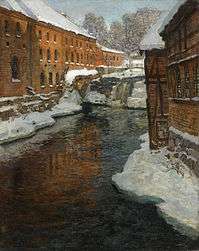 Fra Akerselven, 1897 until 1901
Fra Akerselven, 1897 until 1901 Fra Dieppe med elven Arques
Fra Dieppe med elven Arques
1895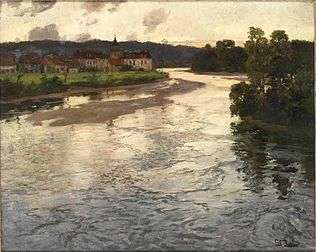 La Dordogne
La Dordogne
1903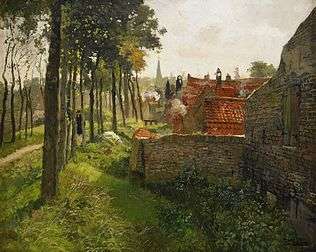 The Priest, Unknown date
The Priest, Unknown date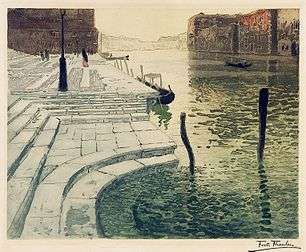 Marmortrappen
Marmortrappen
1903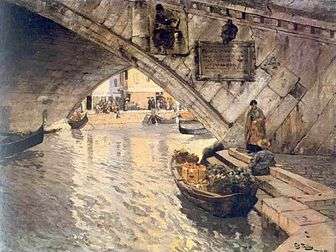 Rialto
Rialto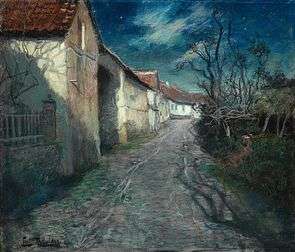
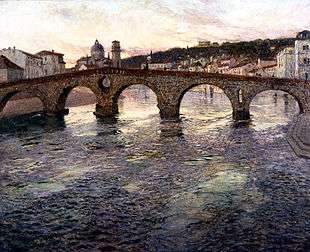 1894
1894
References
- ↑ Frits Thaulow – utdypning (Store norske leksikon)
- ↑ Harald Thaulow (Store norske leksikon)
- ↑ Frits Thaulow (Kulturnett.no)
- ↑ "Frits Thaulow: 'Fra Skagen' 1879", Blomqvist. (Norwegian) Retrieved 25 October 2013.
- ↑ Impressionism: Frits Thaulow (Allpaintings Art Portal)
- ↑ Norwegian painter and engraver Frits Thaulow (GoNorway)
- ↑ Simona Pakenham, Sixty Miles from England, p.148-149
- ↑ Alexandra Lasson on Geni website
Other sources
- Pakenham, Simona. Sixty Miles from England: The English at Dieppe 1814-1914, (London, Macmillan, 1967).
- Poulsson, Vidar Frits Thaulow: 1847-1906 (B.A. Mathisen. 1992) ISBN 978-82-91255-00-2
- Poulsson, Vidar; Thune, Richard M. Frits Thaulow (Hirschl & Adler Galleries; 1985)
- Haverkamp, Frode (trans. Joan Fuglesang) Hans Fredrik Gude: From National Romanticism to Realism in Landscape (Aschehoug. 1992) ISBN 978-82-03-17072-0
| Wikimedia Commons has media related to Frits Thaulow. |
External links
- Kulturnett.no
- Small town square, Fritz Thaulow on the official website of the Musée Rodin.
- Alexandra Lasson on Geni
